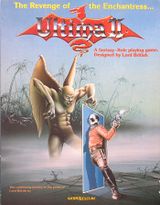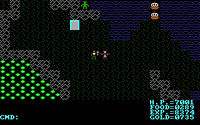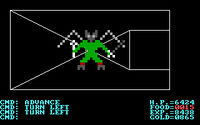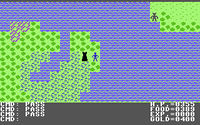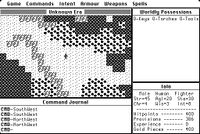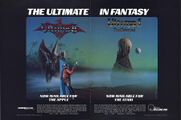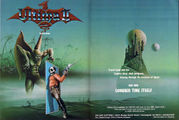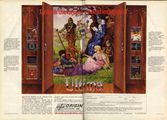Ultima II: The Revenge of the Enchantress
Ultima II: The Revenge of the Enchantress is the second installment in the Ultima series. It was released on August 24, 1982 and published by Sierra Online for the Apple II, IBM PC and Atari 8-bit. Later conversions for the C64, Atari ST and Macintosh followed. Graphics and gameplay changed only little from Ultima I, making the game very similar to the previous one.
Gameplay[edit]
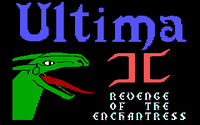
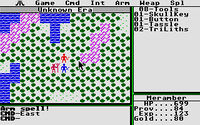
The game deals with several different time periods on Earth, has numerous pop-culture references, science fiction elements, and travel throughout the Solar System. The game as released is also quite buggy, and has many areas that are simply empty (some of the planets of the solar system have literally nothing on them).
The Story[edit]
Spoiler warning: Plot and/or ending details follow.
The player, again as the Stranger, does not have the task to save Sosaria, but instead Earth itself from the enchantress Minax. Being the lover and apprentice of Mondain, she is quite angry over his death by the Stranger's hand, and swears revenge. Suspected to have manipulated the timeline to this end, she let Earth die in an atomic holocaust in 2111 – all life on Earth perished, leaving the Aftermath.
The Stranger, having escaped from the changes in the timeline at the last moment, has to decipher the mystery of the time doors, which enable time travel, to reach Minax and prevent these horrible events from ever happening. Gathering the only weapon that can kill Minax, the Quicksword Enilno, and wearing the protection of the Force Field Ring, the Stranger travels back to the Time of Legends and confronts Minax in her castle to kill her. With her death, the timeline returns to normal, with no one remembering the horrible events that occurred in the changed timeline – all except the Stranger.
Spoilers end here.
Development[edit]
Sierra On-Line, located in California, was chosen to publish Ultima II because they were the only company willing to include the cloth map with every game, on which Richard Garriott insisted.[1]
After a number of difficulties dealing with Sierra, the Garriott family founded Origin Systems in their home state of Texas. Afterwards, their former publisher refused to sell the rights to Origin for many years and did not relinquish the original cover artwork until 1998 at the latest. Because Origin did not acquire the rights to the original Ultima II cover art, a stand-in was used for subsequent anthology re-releases of the game. The stand-in is a cropped version of the original cover for Akalabeth. The Ultima Collection finally has the original cover art (on the box and the documentation files).
Differences between Platforms[edit]
- Main article: Computer ports of Ultima II
Ultima II was released on platforms with a wide range of abilities. The Apple II series, MS-DOS, and Atari 8-bit releases were limited to 4 colors. Areas idealized as black in 4-color versions were filled in with color on the Commodore 64's 16-color release, and with bright white on the 16-color Atari ST. Fitting its display at the time, the Macintosh-port was entirely in black and white.
Most ports relied solely on a keyboard interface; however, the Macintosh and Atari ST both were heavily mouse and menu-driven.
Japanese computers NEC PC-8801 and 9801 supported a maximum of 8 colors, while the MSX2 capable of 16 total; both saw an Ultima II that looked and played far more like console games of the time. The FM Towns release supported 32,768 colors (though it is unclear how many were used) and stereo sound, making it the most advanced of the many ports.
Although this game was never remade or updated for the PC platform, a little-known upgrade (similar to what was done for Ultima I) was made for the Apple II. It was only released as part of the Ultima Trilogy I II III anthology of the first three games, and is extremely rare today. (Only the Apple version received the update. The versions of the trilogy boxset for the PC and Commodore 64 contain the original, unaltered Ultima II for their respective platforms.)
Release[edit]
Ultima II was highly praised for its fast-paced gameplay, quality graphics, and realistic worlds.[2] It was successful in 1982, and sold well enough that Richard Garriott could found his own company, Origin Systems, which was to be the publisher for all future Ultima games. After the first release in the big box, two more issues of the single game from Sierra followed, the first in a black-bordered box, the second in a grey-bordered box.
This game was included in several compilations:
- Ultima Trilogy I II III (1989)
- Ultima Value Pak (1990) as part of the Ultima Trilogy I
- Ultima I-VI Series (1993)
- Ultima Collection (1998)
In Japan, the game was included in the compilation Ultima Complete.
Included with the Game[edit]
The initial release of Ultima II included these things with the game:
- The book The Second Age of Darkness.
- The Player Guide.
- A cloth map of Earth in Ultima II, together with the codes for the time doors.
- Ultima II galactic map.
Upgrades and Patches[edit]
- For the PC, the fan-made Ultima II Upgrade Patch converts the CGA-graphics to 16-color EGA graphics, builds in a frame limiter, fixes a number of bugs and inserts new commands into the game.
- Two patches for the original Apple II version (not the remake) exist. One will fix the bug that prevents increasing the "Strength" stat once the character creation process is over, and the other makes the game a bit harder by forcing the player to enter the dungeons and towers, because an important resource will now be found only in there.
- Ultima I-VI Series had a bug that caused many of the planetary maps to appear as Earth maps. A fan patch corrected this.
More Game Related Information[edit]
- For a complete walkthrough, see Ultima II walkthrough.
- For more detailed information on character statistics, see Character attributes in Ultima II.
- For bugs in this game, see Ultima II bugs.
- For Easter eggs and real-life references in this game, see Ultima II real-life references and Easter eggs.
- For a map viewer, see Ultimatrix.
- For a saved game editor, see Ultima Saved Game Editor.
Trivia[edit]
- Richard Garriott has said on multiple occasions that the time doors and map in this game were inspired by the movie Time Bandits; this likely goes for the Time of Legends and the existence of Minax's castle in it as well.
- The front and rear covers of Ultima II comprise one larger piece (the back half was also used as standalone box art for Sierra's Ultima: Escape from Mt. Drash). It is the only installment not to feature a cover painting by series mainstay Denis Loubet; however, as part of his Patreon campaign in 2015, Loubet consulted Richard Garriott for design input and completed a concept illustration for an alternate Ultima II box cover (seen below), indicating what the artist might have produced had he been commissioned for the original release.[3]
- When the game begins, Lord British will heal the Stranger 300 HP for each 50 gold coin given him. Later on, after gaining more strength, it drops to 100 HP per contribution. This may have been done so as to decrease the likelihood of rolling over the HP counter, which would instantly kill your character.
- This is one of the first graphical games ported to the Atari ST.
- This game is the first original release of an Ultima game on more than one system.
- This is the last Ultima not published by Origin, unless one counts Escape from Mt. Drash.
- South Park co-creator Trey Parker cites Ultima I and Ultima II as early examples of his keen interest in role-playing games, which would inspire the development of The Stick of Truth and The Fractured but Whole, two role-playing video games set in the South Park universe.[4]
- After releasing Ultima V, Origin put out an advertisement for all five up to then released games. However, Ultima II is missing from it. The most likely reason are the problems with Sierra mentioned above.
- The dragon depicted in the title screen is taken from the cover of Ultima I.
Gallery[edit]
External Links[edit]
- The collectible Ultima – Ultima II
- Ultima II – The Revenge of the Enchantress! – C64 Wiki
- Ultima II: The Revenge of the Enchantress (Wikipedia)
- Ultima II – The Other Codex
- u2 Archives – A variety of Ultima II upgrades at The Exodus Project
- Ultima II nitpicks
- Ultima II – Ultima Aiera
- Ultima 2 (YouTube)
- Ultima II – Article on Classic Computer Role-Playing Games
References[edit]
- ↑ Shay Addams. The Official Book of Ultima. Compute! Books: 1990. Page 23.
- ↑ Softline, Volume 2.3. January 1983. Page 40.
- ↑ Loubet, Denis. “The Ultima II cover that never was!”. The Ultima Codex. 2015-03-12. Retrieved 2015‒03‒15.
- ↑ “South Park 20th Anniversary SDCC 2016 Hall H Panel with Trey Parker and Matt Stone”. YouTube. 2016‒07‒23. Retrieved 2017‒10‒17.
